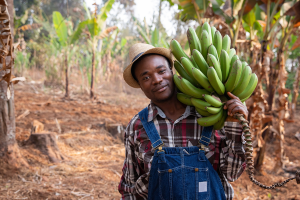The Center on Global Food and Agriculture provides a bold vision for a 21st Century of zero hunger in a healthier and more equitable world.
During the 2022 World Food Prize Borlaug Dialogues, the Chicago Council on Global Affairs and The Rockefeller Foundation gathered experts and stakeholders from climate, agriculture, food security, and humanitarian backgrounds to discuss a bold vision for a 21st Century of zero hunger in a healthier and more equitable world. The white paper, “Defining the Path to Zero Hunger in an Equitable World,” reflects a summary of their views and offers a framework to reimagine a hunger-free world.
The quickened pace of extreme weather events, disruptions to agricultural markets from the war in Ukraine and other conflicts, and a fragile post-pandemic international economy rattled the global food chain. A culmination of these realities is complicating the dual imperative to both nourish the planet and preserve it from environmental threats. According to the 2022 IPCC report, without immediate changes, extreme weather will likely render large areas of crop and livestock land unsuitable by 2050, potentially pushing millions of people into food insecurity.
The newly outlined white paper tackles some of the greatest obstacles facing the nexus of food security, climate, and humanitarian spaces, and ultimately voices hope for a better food future. It amplifies this message by providing an analysis of three major obstacles—silos, myopic priorities, and top-down decision-making—in conjunction with catalyzing ideas that address these challenges.






